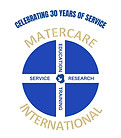Anointed to Heal
- MaterCare International

- Apr 14, 2025
- 3 min read
Updated: Apr 16, 2025
Every year during Holy Week, Catholics gather in diocesan cathedrals for one of the most profound liturgies of the Church year: the Chrism Mass. At this Mass, the bishop blesses three sacred oils each with a unique purpose in the sacramental life of the Church. One of these is the Oil of the Sick, a simple yet powerful sign of God’s mercy, offered especially to those who suffer in body, mind, or spirit.
For Catholic healthcare professionals, the Oil of the Sick is more than a liturgical symbol. It is a tangible expression of the Church’s commitment to care for the sick with compassion, dignity, and hope. It connects the everyday work of medical care with the healing ministry of Christ himself.
The Oil of the Sick is blessed during the Chrism Mass, usually celebrated on Holy Thursday morning or another day earlier in Holy Week. This oil is later used throughout the year in the Anointing of the Sick, a sacrament that offers spiritual and sometimes physical healing to those who are seriously ill, elderly, or near death.
In the blessing of the oil, the bishop prays:
“Send the power of your Holy Spirit, the Consoler, into this precious oil... to relieve the pain of those who are sick, to bring them healing in body, in soul, and in spirit.”
This sacred moment is not just a ritual, it is a commissioning. The oil becomes a sign of Christ’s healing love, carried by priests into hospital rooms, nursing homes, and homes of the faithful. Through this sacrament, the Church says to the sick: You are not alone. Christ is with you. And we are, too.
Our Christian doctors, nurses, chaplains, therapists, and aides live out the Gospel in places of vulnerability and suffering. Whether or not they are present at a Chrism Mass, the Oil of the Sick speaks directly to their mission.
It is a reminder that every act of care, no matter how routine, is sacred. It affirms that physical healing is part of the holistic care the Church is called to offer, a care that embraces the whole person, body and soul. In many ways, those who serve in healthcare extend the compassion symbolized by the Oil of the Sick, even outside the sacramental context.
Moreover, Catholic healthcare is deeply rooted in the belief that human dignity does not diminish with illness, disability, or age. The Anointing of the Sick reinforces this truth. It assures the patient that their life is precious in God’s eyes, even when the world may say otherwise.
The blessing of the Oil of the Sick during the Chrism Mass also emphasizes the unity of the Church in her healing mission. From the bishop’s cathedral to the smallest rural parish, from major hospitals to bedside anointings, the same oil is used, blessed by the same bishop, consecrated for the same mission.
This unity is deeply consoling. It means that no act of care is isolated. Every Catholic healthcare worker participates in something bigger than themselves: a Church-wide, Christ-centered mission to bring hope to the suffering.
The Oil of the Sick is not magic. It does not guarantee physical healing. But it does promise something deeper: that in the face of suffering, God has not abandoned us. Christ, the Divine Physician, walks with the sick and with those who care for them.
The Chrism Mass is a powerful annual reminder of this sacred calling. As the oil is blessed, so too is their vocation. They are anointed, in their own way, to continue Christ’s healing work in the world.
May all who serve the sick be strengthened by the Spirit and upheld by the prayers of the Church.



Comments